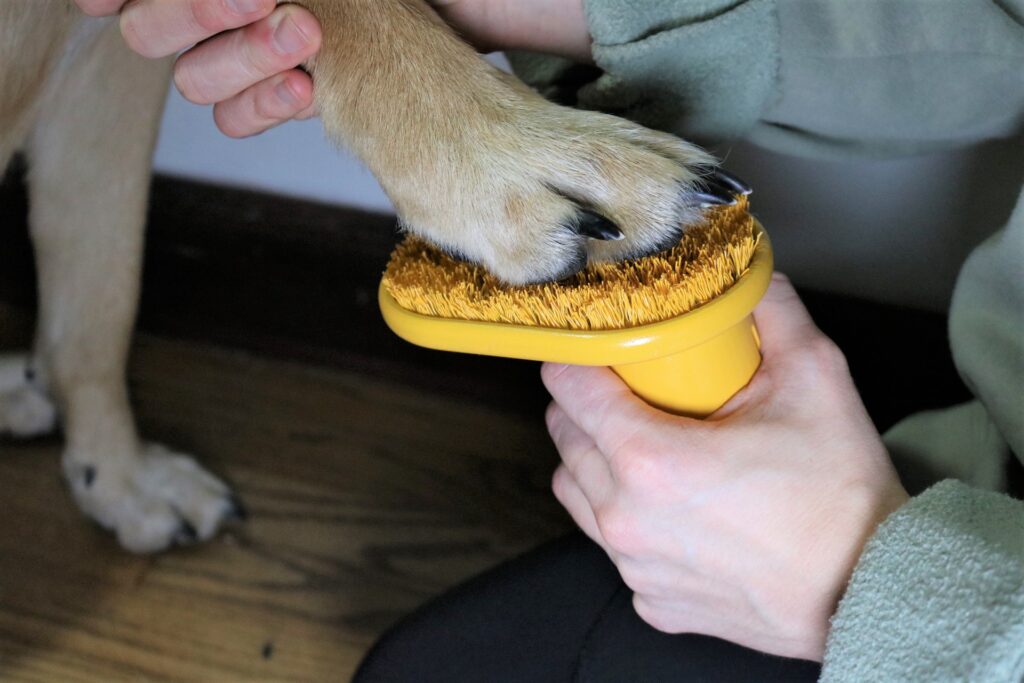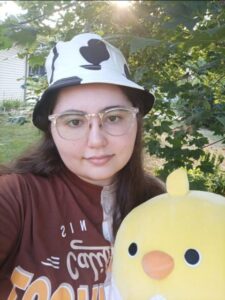
The Pup Rub Speedy Paw Protector created by UW-Stout recent graduate Claire Dronen earned a third place in the International Housewares Association Inspired Home Show’s annual Student Design Competition.
Other art and design students participate in game jams, speak at Games for Change
University of Wisconsin-Stout recent industrial design graduate Claire Dronen loves walking, running and being outdoors with her mixed-breed dog, Benji.
To protect Benji’s paws, Dronen tried doggie boots, which Benji disliked and pulled off quickly. She then started to use wax to protect Benji’s paws from snow, ice, salt and other elements as well as provide better traction on slippery floors.
“It’s really messy,” Dronen said of applying the wax. “You had to use your fingers and it took a long time to get the wax applied.”
Then Dronen came up with the paw-fect idea to create an applicator for paw wax.
For her Industrial Design 5 class in fall 2020, Dronen designed the PupRub Speedy Paw Protector, an application device for the paw wax.
“It is really neat,” Dronen said. “This applicator solves multiple problems for both humans and canines. Color, materials and finish were important considerations, and its portable size makes it easy to bring when you are on the go.”

Claire Dronen / Photo courtesy Claire Dronen
PupRub garnered Dronen, who graduated in May, third place in the International Housewares Association Inspired Home Show’s annual Student Design Competition. She garnered a $1,000 award.
The IHA created the competition in 1993 to invigorate the housewares industry with the fresh ideas of top student designers and to encourage young talent to consider careers in the housewares business. Now in its 28th year, IHA’s competition is in the U.S. as the longest-running, industry-sponsored, merit-recognition program for industrial design students.
Dronen is elated with placing in the contest. “There were 146 applicants,” she said. “There were entries from last year and this year so there was a larger pool.”
Design Professor Jennifer Astwood taught the class in which Dronen developed PupRub. “She was headed in a specific direction during the midterm part of the project, but she trusted her instincts and she followed her design research,” Astwood said. “Claire chose to pivot her final direction to an area that made more sense. She continued to develop her design work and do additional prototyping to develop a more successful design.”
Dronen works full time as an associate industrial designer at Avient Design in St. Louis, a product manufacturing, design and testing company. She was an intern at the company from September to December 2020 as part of the Cooperative Education and Internship Program at Career Services.
After working at Avient Design, Dronen said she would have incorporated a broader knowledge of injection molding to her PupRub design, which she does not plan to market at this time.
Research and thoughtful testing lauded
Judges’ comments included calling the design an “informative, clean presentation with fine sketches and narrative.” They noted Dronen had done “deep research into available products and thoughtful testing with various dog sizes.”
UW-Stout assistant professor of industrial design David Richter-O’Connell was one of the judges.

PupRub was designed to be in different colors. / Photo courtesy Claire Dronen
Dronen said Benji was not her only tester of PupRub. She tried the applicator on her friends’ dogs and even traveled to multiple dog parks to try it on other dogs.
As an alum, Dronen said she loved the Menomonie and campus community. “The classes are smaller, so everyone becomes closer friends,” she said.
She started as a graphic design major but decided to change to industrial design when she saw other students’ work and realized she wanted to work with her hands, designing. “I saw cool classes and cool opportunities,” she said. “Internships were available for me to develop my professional self. You get a different perspective at an internship. The school lays the foundation you need. It is the diving board into the swimming pool and that pool is huge,” she added, smiling.
“I love the problem-solving of industrial design,” she said. “It has really practical applications. I do feel some responsibility as an industrial designer to consider sustainability and all its facets and make quality items.”
Dronen also hopes more women will enter the industrial design field. In the U.S. just 19% of industrial designers are women, and in the United Kingdom that drops to 5%.
“That isn’t enough representation,” she said. “We need more women in design.”
Game jams build experience

Paityn “Lou” Brown / Photo courtesy of Lou Brown
Paityn “Lou” Brown, a junior game design development–art major from New Prague, Minn., attended three virtual game jams this summer. A game jam is a short burst of game development from a day or two to even a few months to make a playable or demo game.
Brown worked on Dungeoneer, Polly Shelly: Phantom Acrabatics and Sky Explorer. In Dungeoneer, players are janitors whose job is to reset the dungeon for the next hero. In Polly Shelly, players are crabs with grappling hook claws seeking to save their Crabeloved. The goal of Sky Explorer is to map out Skyland.
In the game jams, Brown usually works on game environment art and prop art.
Being a part of the jams gives Brown more experience beyond the classroom in game development work and provides networking opportunities.
“I enjoy the ability to step back and do my own best and get a strong pipeline developed,” Brown said. “With game jams, we have constant communication and an awareness of each other and of the slowly impending time limit. Additionally, everyone knows their role well and gets help when they need it.”
Brown urges others to take part in game jams.
“They are an incredible way to network with great people and make fun games,” Brown said. “And for any hesitancy, roles inside game jams are more than simply art and code. Other roles like SFX, music, game or puzzle design, project management, engine implementation and level building are all excellent roles to pick from that don’t solely rely on one proficiency and are also in high demand.”
Brown chose UW-Stout for its location to home, affordable tuition and quality education. Brown’s goal is to become a 3D/2D environment artist with some prop and creature design experience.
Falck part of panel

Eleanore Falck / Photo courtesy Eleanore Falck
UW-Stout student Eleanore Falck of Ashland participated in the virtual Games for Change Festival July 12-14. She was part of the panel Reframing Educational Games Through Indigenous Lenses.
Falck, a senior majoring in game design and development-art, created Growing up Ojibwe: The Game during a summer internship with the Great Lakes Indian Fish and Wildlife Commission in 2019 and then expanded the game during an internship in the summer of 2020.
Highly ranked programs
In game design, Princeton Review this year ranked UW-Stout No. 5 in the nation for its undergraduate program and No. 7 for the Master of Fine Arts in design program among public universities.
For both programs, UW-Stout was No. 1 in Wisconsin and the top 25 in the nation overall.
By Pam Powers
